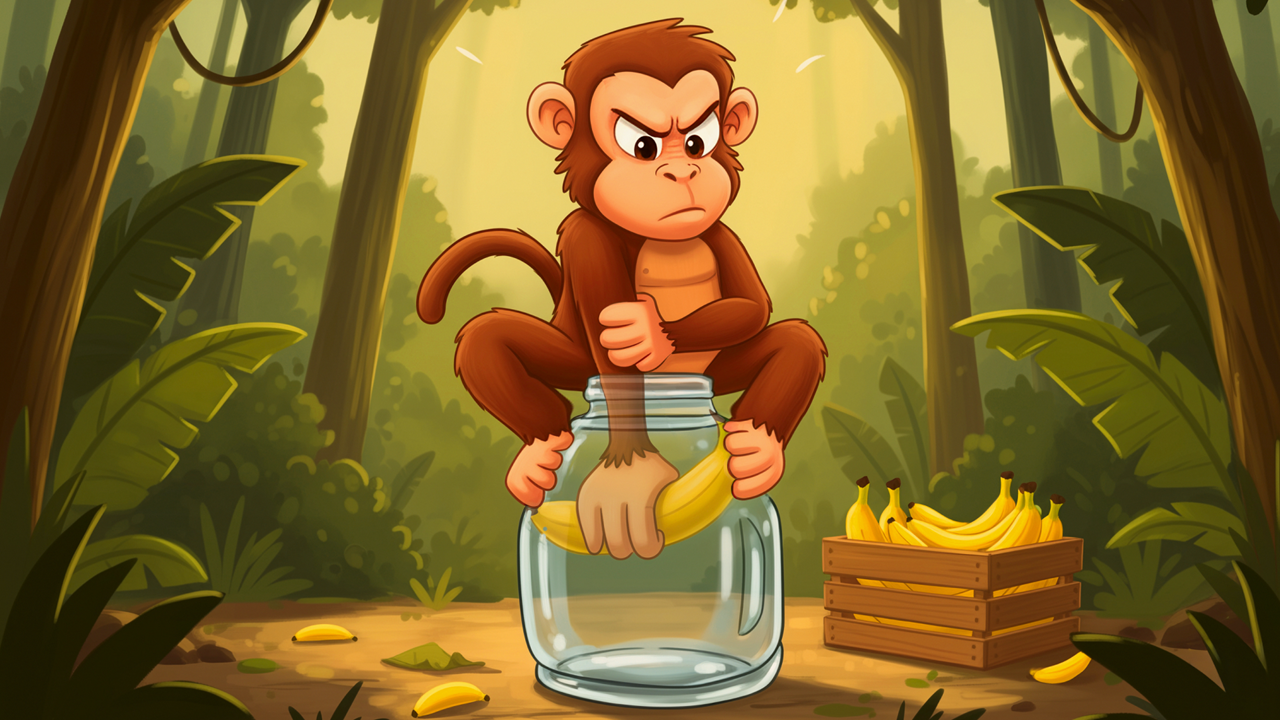The monkey, the banana, and the investor’s dilemma: Why you must learn to let go…
Hunters once discovered an easy way to trap monkeys. They’d place a ripe banana inside a jar with an opening just wide enough for the monkey to slip its hand through. The monkey, lured by the golden fruit, would reach in and grab it. But when the monkey tried to pull its hand out – still clutching the banana – it couldn’t. The neck of the jar was too narrow.

The monkey was free to escape at any moment – if only it would release the banana – but it didn’t. It remained at the jar, fixated on its prize, unwilling to let go of what it wanted most and, in the process, losing what mattered most – its freedom.
Every investor, at some point, becomes that monkey! 🐒
Attachment anxiety
You’ve probably already figured out where I’m going with this analogy. The banana in this story isn’t just a banana; it’s the stock you just can’t let go of! Probably because:
“It’s just a pullback”
“It’s fallen too far”
“It’s too cheap/undervalued”
“It’s oversold, it will bounce back”
“It’s just out of favour, it won’t be long until people realise it's true value”
“I can’t sell now because it will be a loss / I will lose too much”
“If I sell now, it’s sure to rocket!”
I could go on. But judging by that twitch in the corner of your eye while you were reading that list… I think I’ve made my point! 😉
We cling to losing positions the way the monkey clings to the banana – out of attachment, hope, and probably, a bit of ego too. The logic goes: “If I sell now, I lock in the loss.” But ladies and gentlemen: The loss already exists – it’s merely unrealised.
Letting go doesn’t mean admitting defeat – it simply means acknowledging that capital, time, and attention are finite. When we’re trapped in unproductive investments, these critical factors can’t be redeployed into better ones. That’s opportunity cost, and it’s one of the most underestimated forces in investing. More on this topic later.
The market’s constraints
Let’s stick with the analogy a little longer. The jar represents the market’s constraints – it’s indifferent and unforgiving. You can’t bend its physics or its will. When the market moves against you, you have two options: Accept its decision or fight it. In the second instance, just remember that the tighter you hold onto that banana, the harder it becomes to escape!
A disciplined investor doesn’t fight the market – they respect it. They accept the market is responsible for their investing outcomes, win, lose, or draw. They also accept that they have absolutely no control over the market or the outcomes it delivers.
Just as important, though, disciplined investors understand what they do have control over: themselves and their decisions. Here, they implement strategies and processes to better protect themselves against the constraints of the market, such as position sizing and a clearly defined exit strategy. Think of these as ways of keeping your hand loose enough to slide out when needed. You can’t control the jar – but you can control your grip!
The courage to let go
Letting go is never easy – because it’s never comfortable. Money is one of the elite few things in life that makes us acutely emotional (and probably the other two of the top three things are linked to it too!).
Ask yourself this: Do you make good decisions when you’re emotional?
If money makes us emotional, then we’re prone to making some very bad decisions when it comes to potentially having more or less of it. As active investors, potentially having to make such decisions on a regular basis, we’re at risk of making some big mistakes when it comes to dealing with profits and losses. I could write a whole other article on the psychology of dealing with profits, but for now, let's say that when it comes to losses:
Exiting an investment at a loss isn’t proof of weakness: It’s proof of strength.
That’s the paradigm shift we must make as investors to give us any chance of being really successful in this game (I’m not talking about bumbling-along-successful like most investors are, I’m talking about shooting-the-lights-out successful!).
The strength to take a loss preserves your most precious resource: Opportunity.
The moment you exit, you reclaim your freedom – the freedom to think clearly, to rescan the universe of opportunity, and to redeploy your limited capital decisively. If only the monkey would let go and reclaim its freedom!
Opportunity cost
What was the first thing you noticed about the monkey and banana in the jar image? What really stood out for you? Was there an “a-ha!” moment? 🤔
Now, I’ve been doing this for a while. I can guarantee you that I’ve made every mistake the average investor has ever made – times 10! 🤦 So, there’s a good chance I’ve had more practice at not being the monkey than most.
Let me tell you the first thing that struck me when I saw the image. It wasn’t so much an a-ha moment – because this moment occurred for me many years ago… you see, I have evolved to the point where taking losses is routine. Taking a loss now is like eating breakfast... I don't even think about it! But if you’re still struggling with taking losses, then I hope this is your a-ha moment:
There’s a whole pile of bananas in the background 🍌🍌🍌🍌🍌!
The monkey could simply let go of the one in his hand and grab any of the many ripe bananas lying within arm’s reach. I call that pile the “universe of opportunity”. It’s every other possible investment open to the investor – from stocks, to bonds, to commodities, to crypto – even antique bottle tops! Whatever’s going to deliver the investor the greatest return with the lowest risk on their dollar – the same dollar that’s gripped vice-like in their hand when they refuse to accept a loss!
Opportunity cost is the single most important driving factor of economics. It is now, and it was back when polished stones and animal skins were the main units of currency. The best investors are masters of their emotions, sure, but they're also masterful at minimising opportunity cost. By doing this, they maximise their return.
So, let go – and take a banana from the pile!
From angry monkey to disciplined investor!
The evolution to a better investor begins in the mind. 🧠
When you detach ego and emotions from investments, decision-making becomes lighter and faster. You think in probabilities, not narratives; respond dispassionately to new information; and are not bogged down in old convictions. Each trade becomes one iteration in a long series, judged by whether it followed your rules and protected your edge – not by whether it satisfied your pride by logging a profit.
Professional investors don’t avoid losses – because this is impossible – they minimise them. They don’t argue with the market. They control what they can control, i.e., themselves, and move on. They know that freeing their capital is only half the battle, freeing their attention is the other half. With this shift, they stop clinging to one banana and start seeing the entire pile.
Every investor faces their moment of truth: hand in the jar, fist clenched, determined not to let go – focused on that one piece of fruit and oblivious to the pile of opportunity just a mouse click away. 🙈
Maybe that was you recently, and if so, I hope this article helps you evolve from a tight-fisted monkey into a disciplined investor. In markets – just like in life – the cost of holding on too tightly is often far greater than the reward of what you’re holding. So zoom out, see the pile, and invest with discipline. 🧐
Sometimes, the smartest move you can make… is to just let go!
This article first appeared on Market Index on Wednesday 22 October 2025
5 topics

